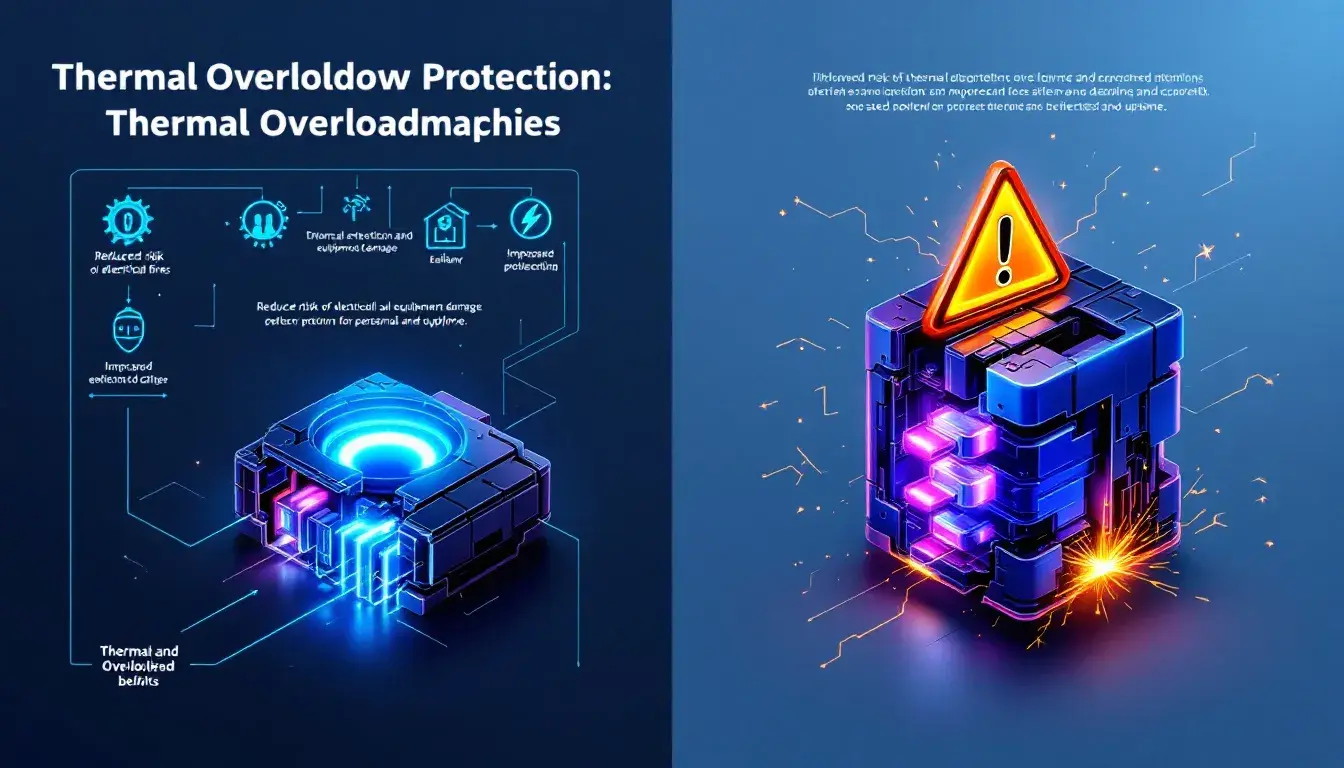What Is An MCB And Its Use In A Home?
A miniature circuit breaker is an electromechanical device that protects an electric circuit from overheating. An electrical issue caused by an overload or a short circuit is referred to as a short circuit.
We used to defend against over-current with fuse wire (in fact, we used to sell it!) back in the day. The concept was simple: an over-current would physically “blow” the fuse wire by quickly heating and melting it.
MCBs expand on this functionality by not being destroyed during an over-current and so being reusable. It’s also considerably easier to use, with the simplicity of ‘on or off switching’ for the circuit isolation. They are much safer to use and operate because the conductor is then housed within some plastic shell.
It’s worth noting that MCBs don’t protect people against electrical shock generated by ‘earth leakage.’ RCDs and the RCBOs are the devices that perform this service.
Kilo Amperes, Amperes, and Tripping Curve are the three main features of an MCB.
Overload Current Ratings – Amperes (A)
When too many appliances are connected to a single circuit, they use more electrical current than the circuit and cable were designed to handle. It may happen in the kitchen if the kettle, dishwasher, electric range, microwave, and blender are used simultaneously. The MCB on this circuit cuts electricity, keeping the cable and terminals from overheating and catching fire.
Kilo Amperes – Short Circuit Rating (kA)
Short circuits are caused by a failure in an electrical circuit or appliance, and they can be even more harmful than overloads since the scale and speed of overcurrent are on a different scale. When the live and neutral conductors are connected directly, this happens. The electrical current rushes around the circuit in a loop without the resistance supplied by regular circuit integrity, multiplying the amperage by thousands of times in moments.
Because of the link between standard voltage (240v) and typical residential appliance power ratings, short-circuit over-current should not exceed 6000 amps. However, when employing 415v and big gear in commercial and industrial settings, 10kA rated MCBs are required. The most Prospective Fault Current that the MCB may withstand while still disconnecting the circuit is shown by these ratings.
Tripping Curve
An MCB’s ‘Tripping Curve’ allows for real-world, and sometimes necessary, power surges. To overcome the inertia of large motors in commercial applications, large machines typically require an initial burst of power over their average working current. The MCB allows this small spike, which lasts only seconds because it is safe to do so for such a short period.
Typical Uses for Domestic MCBs
While each installation is unique and should always be planned by a fully licensed professional electrician on-site, most household wiring schemes follow the following guidelines:
Lighting circuits rated at six amps
Large lighting circuits rated at ten amps, albeit these are becoming less common in home settings as technology and trends shift toward lower-energy lighting sources like LEDs.
Both 16 amp and 20 amp are often used for immersion heaters and boilers, depending on the power rating.
Ring Final – 32 Amp The power circuit are referred to as “sockets” in technical terms.
Cookers, electric hobs, and tiny showers require 40 amps.
Electric showers and hot tubs with a 50 amp – 10 kW power supply.
There are five uses for MCBs that you may not be aware of.
A well-established electrical system is one of the most crucial needs for the effective functioning of your home, factory, or workplace. Every piece of domestic equipment and machinery consumes a significant quantity of energy, necessitating safety precautions when using electricity. Power surges can cause voltage changes that are exceedingly harmful and dangerous.
Miniature circuit breakers are small devices that act as control agents in the event of a power outage. When it detects an overload or a power surge, this device shuts down the electrical system. Various varieties of MCBs can be used in your homes and businesses, depending on the nature of the electrical applications. Miniature breaker circuits are ideal for dwellings and the buildings with limited electrical infrastructure. Here are some applications for MCBs that you may not have considered.
1. Electrical Panels in the Home
To protect dwellings against overload, miniature circuit breakers are utilized. They are more reliable and safer than fuses because of their ability to manage massive amounts of electricity. One of the most significant advantages of an MCB is that it ensures that electrical energy is distributed evenly across all devices.
2. Lights
Every home has a sophisticated lighting system. These can help with the efficient distribution of electricity throughout the house’s lighting systems. Compared to regular light bulbs, fluorescent lamps, for example, use a lot of electricity to operate. MCBs come to the rescue in this situation. MCBs also aid in the maintenance of light bulb quality and safety.
3. Applications in Industry
In both small and big scale companies, miniature circuit breakers can be adequate safety mechanisms. In an ideal world, most industrial gear would require a power supply of up to 30 kA. In this instance, replacing old fuses with MCBs is required. MCBs play a critical function in commercial facilities, ensuring the efficiency of applications and installations by optimizing energy flow. Hotels, supermarkets, and bakeries all make use of them.
4. Heaters
MCBs are a reliable safety option, particularly if you have heaters installed in your home or office. Heaters, in general, are prone to excessive voltage swings since they consume such a large quantity of electricity from the main supply. These instances can be avoided with the proper installation of a small circuit breaker. Miniature circuit breakers come in various shapes and sizes, each capable of handling a specific power load.
5. Ground Fault Trip Mechanism
When the live wire does touch with a transmitting surface that isn’t part of the circuit system, a ground fault occurs. When there is a failure in the circuit, the rate of current flow rises. An MCB starts its magnetic tripping mechanism and rectifies the circuit system at this point.
Tel: +86-577-88671000
E-mail: ceo@tosun.com
Skype: tosunelectric
Wechat: +86-139 6881 9286
WhatsApp: +86-139 0587 7291
Address: Room No.1001 Wenzhou Fortune Center,Station Road, Wenzhou, China
REQUEST A QUOTE
WhatsApp us
 : +86-139 0587 7291
: +86-139 0587 7291 English
English Español
Español Русский
Русский Français
Français العربية
العربية Português do Brasil
Português do Brasil Українська
Українська Türkçe
Türkçe Polski
Polski Nederlands
Nederlands Italiano
Italiano Bahasa Indonesia
Bahasa Indonesia हिन्दी
हिन्दी اردو
اردو አማርኛ
አማርኛ Հայերեն
Հայերեն ไทย
ไทย Монгол
Монгол فارسی
فارسی Shqip
Shqip Ελληνικά
Ελληνικά


